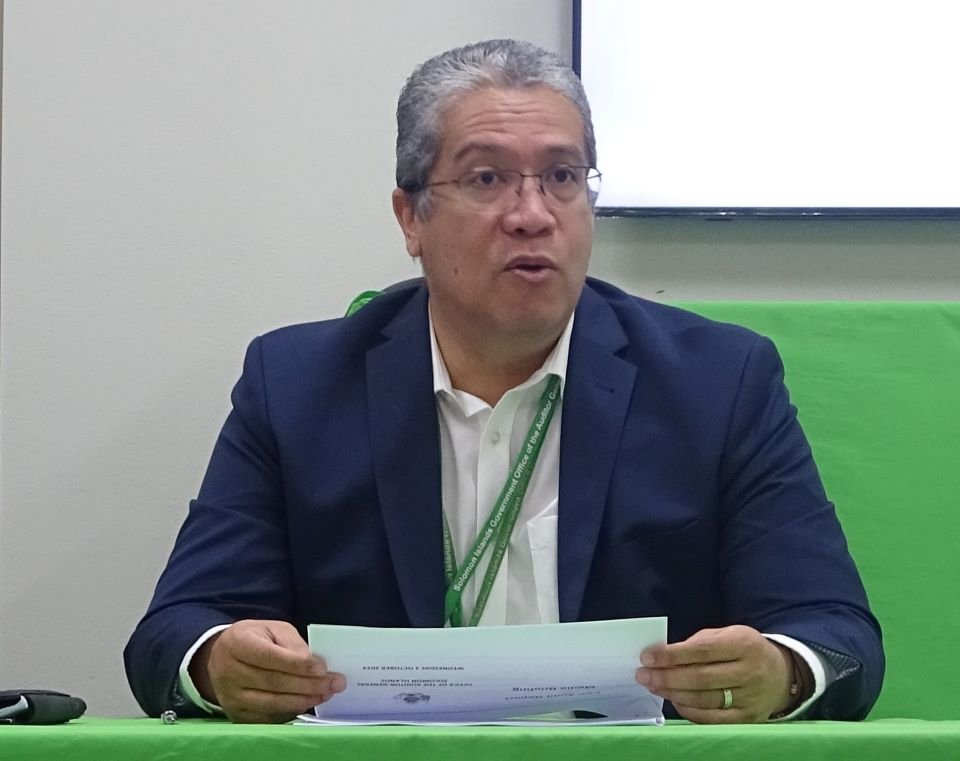
BY CHRIS ALEX
THE Solomon Islands Office of the Auditor General (OAG) has unveiled significant concerns regarding the government’s management of the Economic Stimulus Package (ESP), which was implemented between 2020 and 2021.
The audit report, released yesterday, highlights alarming inefficiencies, insufficient legal frameworks, and troubling gaps in transparency during the allocation of public funds.
In a pre-launch press conference, Auditor General David Dennis stressed the most critical findings from the audit. These included the improper use of imprest accounts and the lack of proper administrative and legal structures governing the disbursement of the funds. Dennis stressed that these issues have raised serious questions about the risk of fraud and misuse of public resources.
The report reveals that the government’s rollout of the Economic Stimulus Package (ESP) lacked a robust legal framework, leaving critical decisions around fund disbursement in a grey area. According to Dennis, the absence of clear guidelines and transparent procedures led to confusion and poor accountability.
“There was insufficient administrative oversight and no clear guidance on how to effectively manage the stimulus package. This left room for potential mismanagement and increased the risk of conflicts of interest,” Dennis explained to local journalists.
The Solomon Islands government approved a $309m stimulus package in May 2020 to support businesses and households during the economic downturn of the COVID-19 pandemic, with payments made between 2020 to 2021.
Moreover, the report pointed to inefficient use of the funds, signalling that the ESP failed to achieve its intended goals of providing relief to those impacted by the pandemic, particularly in the agricultural sector, which had been severely affected.
One of the major red flags raised in the audit was the improper use of imprest accounts—temporary accounts used by government agencies to manage small expenditures. Over $33 million was paid through these accounts to small agricultural enterprises and local farmers. However, the Office of the Auditor General (OAG) uncovered numerous instances where government officials signed on behalf of beneficiaries without proper authorization.
In one obvious case, a single government official signed for over $6 million worth of payments, raising concerns about the possibility of fraud.
“It is not clear whether that individual had the authority to sign on behalf of the recipients, and this practice clearly violates internal control requirements,” Dennis noted. “We are highlighting this as a very high risk of fraud.”
The findings resonate with the experiences of some local farmers. One farmer from West Makira, Bethel Babari, shared his frustration over the ESP’s management.
“I was told by someone to apply for the package, but I didn’t know how to do it,” Babari said. “The person told me they would handle it for me, but I waited for one year and received nothing at all.”
Babari’s experience is symbolic of the wider issues raised in the report. It appears that while funds were being allocated on behalf of beneficiaries, the actual recipients never saw the money. Such cases further demonstrate the breakdown in accountability and highlight the need for stricter controls over how funds are distributed.
The audit report raises essential questions about the integrity and efficiency of the ESP’s management. Dennis emphasized the need for tighter governance and stricter internal controls to ensure public funds are managed responsibly, particularly in high-risk situations like the ESP.
The OAG’s report signals a critical opportunity for the government to improve its financial management practices, particularly in the face of future crises that require swift and significant financial intervention.